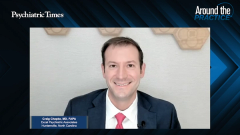
Patient Case #1: Differentiating Between ADHD and Other Psychiatric Comorbidities
Experts in psychiatry discuss tips to differentiate between ADHD and other co-morbid psychiatric disorders.
Episodes in this series

Stephen Faraone, PhD: We've been talking about in this conversation, depression anxiety is one of the signs in this case discussion. Dr Chepke how do you differentiate between ADHD and co-morbid disorders? Some healthcare professionals like to say, they have depression or ADHD they can't have both. What do you do in those cases?
Craig Chepke, MD, FAPA: That that just made me laugh. As you can see, they can have both, but it can be difficult to tell. As I was saying a few minutes ago, what percentage of that is related secondarily to the consequences and the fallout of the ADHD? Every case is different obviously, with each individual person. But oftentimes, I take advantage of the fact that when we do treat ADHD with stimulants, we have a very rapid response, unlike with things like major depressive disorder or anxiety disorders, with ADHD with stimulants, we can see results within a couple of days. And so sometimes what I like to do if it's - if it's correct for that individual patient, is if I know that they do have ADHD, and I'm wondering about the strength of the co-morbidities, treat the ADHD and see what's leftover, are they able to manage their depression and anxiety better? Or can I see that they're on a pathway that with improving their coping skills, maybe with psychotherapy, that they would get there, or do they need secondary pharmacotherapy for a depressive or anxiety disorder? Of course, if they are suicidal acutely, something like that, that's a different story, but what we're talking about is a situation where there's not an acute need to treat the depressive disorder with some sort of major intervention like hospitalization, something of that nature, obviously.
Stephen Faraone, PhD: That's right, I think a general rule of thumb is start treating the disorder that's causing the most impairment, the most difficulty, the most problems in the patient's life. Treat that, and if there's something left over, treat that as well.
Craig Chepke, MD, FAPA: We must get over the stigma that clinicians have, that ADHD can't be causing that much problem, that ADHD could be the primary driver behind the patient's function and quality of life difficulties. That could be the difficulty.
Stephen Faraone, PhD: It absolutely is, and in fact, we talked before about diagnostic delays, Craig, and how that causes problems to people's lives. Maybe we should emphasize that a little bit to the audience, that the risks of untreated ADHD, of delaying diagnosis and delaying treatment, can be severe. I've mentioned a few, increases of traffic accidents, increases of antisocial behavior, and criminality. In fact, the prevalence of ADHD in prisons is about 25%, it's huge, and it's essentially because many of those people were never treated and because of that they ended up engaging in criminal behavior. There's even data from very large registry studies in Scandinavia, that people with ADHD are more likely to experience premature death, primarily due to traffic accidents - not just traffic accidents, any kind of accident.
Thank you, there is a high risk for suicide. And for most of these very serious outcomes there's also good data showing that when patients are treated, the risk for these adverse outcomes decreases. We all need to be able to tell people who are worried about taking medications that you have balance what they see as the risks of taking medication with the risks of not taking medication. And a lot of risks are, as we know, extremely serious.
Craig Chepke, MD, FAPA: I'm glad you brought that up because that for me, brings up a point that we haven't discussed that much today. We've talked about inattention, hyperactivity, emotional dysregulation, and executive function difficulties, but impulsivity we haven't really mentioned today and that is just a tremendous difficulty for people with ADHD and impulsivity impacts someone all day every day. When patients will ask, "Do I need to take my medication on weekends?" Or things like that, "Well, do you drive on weekends? Because driving is all about impulse control when you're trying to make a left turn across traffic, do you try and beat that guy coming the other direction, or do you wait and let him pass?" That's a split-second decision. Things like relapsing onto substances, someone offers you a joint when you're trying to stay sober, you have a second to decide, are you going to take it and take a puff? Or are you going to say, "No, I'm trying to stay away from that." So, criminal activity, etcetera. Impulsivity is such a core symptom of ADHD that I think we need to consider when we're looking at, as you said, potential non-treatment and the risks of that.
Stephen Faraone, PhD: I am so glad you brought that up because there is this old mythology that is left over from the 1960s and 70s, where kids were placed on what were called 'drug holidays', and that was primary due to concerns about the effects stimulants on growth which have subsequently been shown to be not that serious. Dr Cerulli, in your own practice, what do you do about drug holiday? People who don't want to take medications at certain points in time in their lives?
Theresa Cerulli, MD: I spent an awful lot of time on psychoeducation, and helping people understand the decisions they're making and the impact that there are as many adverse effects, if not more, to not taking medication. Although their concern is often the adverse effects of taking medication, we work and should continue to work hard as clinicians to find something that the patient can take without feeling medicated, with minimal side effects, that they can take consistently. This is a 24/7 condition, it is a prevalent and persistent condition, and we shouldn't be taking a break from treating what we've just discussed can have severe morbidity and even mortality when untreated.
Andrew J. Cutler, MD: You know Steve, I make it easy for patients, I tell them, "Look, you only have to take the medication on the days when you have ADHD."
Stephen Faraone, PhD: That's right. If the disorder goes on holiday, you can go on a drug holiday. That's another way to say it.
Theresa Cerulli, MD: I've been trying to add - This may sound off-topic, but I was trying to raise this issue a few questions ago, and that is that we are, Andy, you mentioned Dr Felds comment about over and under, and I thought you were going to say that we're over and under diagnosing ADHD because that's how it still feels to me. The mistakes go in both directions. Whereas a lot the time patients are feeling like, "Oh my gosh, everybody has ADHD, it's the en vogue diagnosis," so, no, we are very much still over and under diagnosing ADHD, and on the adult side, of patients with ADHD, 75% to 80% are not currently diagnosed and treated. Still, our statistics are poor in this realm.
Stephen Faraone, PhD: That is quite right. As I said before, there are 12 million adults out there, and many of them are not treated, and one reason is that many of these adults must be managed by a primary care professional, we don't have enough psychiatrists to treat all the adults with ADHD in the United States.
Transcript edited for clarity
Newsletter
Receive trusted psychiatric news, expert analysis, and clinical insights — subscribe today to support your practice and your patients.











